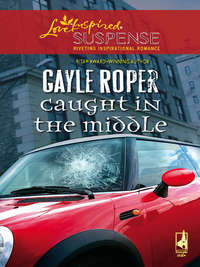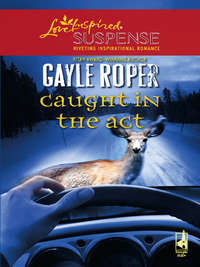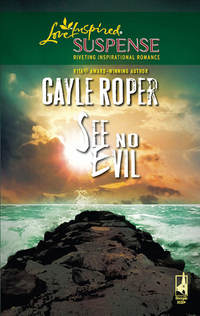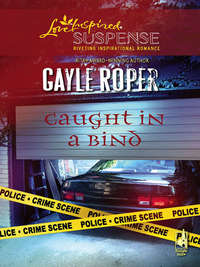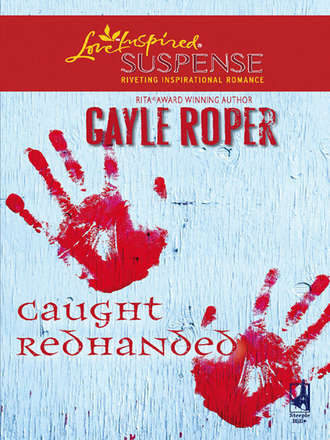
Полная версия
Caught Redhanded
“Is this Merrileigh Kramer, award-winning journalist?” a man asked, his familiar voice booming down the line. Though he was reticent by temperament, he always projected on the phone like an out-of-work actor auditioning for a last-ditch opportunity at a starring role.
I pulled the phone away from my ear and stared at it in disbelief. Why was Ron Henrey, my former editor back in Pittsburgh, where I had cut my reporting teeth first as an intern, then as a staff reporter, calling me?
“Are you still there, Merry?”
I jammed the phone back against my ear. “I’m here, Mr. Henrey.”
“Surprised you speechless, eh?”
“Something like that,” I admitted. He was certainly high on my list of People I Never Expect To Hear From.
“Congratulations on winning that Keystone Press Award. We taught you well, I’d say.”
“I’d say,” I agreed.
There was a little silence while I tried to imagine why Ron Henrey was contacting me. Certainly he wasn’t calling to interview a hometown girl made good. That would be an assignment given to a features reporter, the Chronicle’s equivalent of someone like me or Edie. Besides I hadn’t made good enough to be worth an article.
“I bet you’re wondering why I’m calling,” he said.
I made a little agreeing noise, which proved to be all the encouragement he needed.
“We’d like you to come back to the Chronicle, Merry. We’d like you to write two or three features a week and have your own column.”
Then he named a salary that made me blink in astonishment. I wouldn’t exactly be rich, but from my present perspective, I’d be close. The cynic in me, rarely used, kept looking for the catch, but I couldn’t see one. Since I’m not a very practiced cynic, it’s often hard for me to find the fly trapped in the ointment. However, the rose-colored glasses I wear with practiced ease illuminated a wonderful vista.
My own column! Real money!
I’d been asking Mac for a column for the past several months. He only looked at me and, cynic extraordinaire that he was, said, “In about ten years, Merry. When you finally grow up.”
I glanced at Mac, sitting at his editor’s desk by the great glass window that looked down from his second-floor perch onto Main Street. He was typing away on his PC, and I felt like a traitor to The News with Mr. Henrey trying to lure me away.
Suddenly Mac looked at me. “Hey, Kramer, when you’re finished, I need to see you.”
As I waved acknowledgement, I tried to imagine Mr. Henrey yelling across the Chronicle newsroom at me. Never happen. First off, the room was too big. Secondly Mr. Henrey, for all his booming phone voice, was a model of propriety. He would either IM me or give me a discreet bring on my desk phone.
“What do you think?” Mr. Henrey was still speaking, booming as ever. “Interested?”
I realized I was smiling. I also realized Jolene was watching me smile and would demand to know why as soon as I hung up. No way was I telling her. I might as well stand on my desk and emote like Mr. Henrey because everyone would know before nightfall.
“May I think about this?” I asked. “You’ve taken me by surprise.”
“You have a week,” Mr. Henrey yelled genially.
Long enough to develop an acid stomach as I debated the pros and cons, but not long enough to get an ulcer. “Sounds fine.”
I hung up, still not believing the offer. Jolene, dressed in a yellow narrow-strapped cami top and a denim miniskirt in spite of the scraped knees, pounced.
“What? Why were you smiling? And don’t try and tell me it was Curt whispering sweet nothings in your ear. He doesn’t yell in the phone.”
Curt! I blinked in disbelief. I’d been so caught up in the unbelievably good offer and so busy being impressed with myself that I hadn’t even thought of my fiancé. Granted I’d moved to Amhearst to learn to be independent, to stand on my own two feet, but a girl should at least wonder what the man she plans to marry in less than two weeks would think about moving.
Probably not much. He was as much Amhearst as Jolene and Mac.
There was nothing for it. I’d have to call Mr. Henrey back and decline his offer.
Maybe not, kid, the perverse part of me said. He’s an artist. Artists can paint anywhere, right?
Hmm, thought the nicer me, jumping much too quickly to agree. That’s true.
“Come on,” Jolene prompted. “Give.”
I tried not to look guilty as I scrambled for something to say that wasn’t a lie but wasn’t exactly the truth, either. I squirmed under her relentless gaze.
She stood and walked across the narrow aisle that separated our desks. I half expected her to stick her index finger under my nose and demand an answer. Instead she spun the little basket of cheery flowers that sat on my desk, checking for dead blooms among the pale yellow double begonia, the miniature pink rose, the crimson geranium and the pale blue dianthus. A regular Gertie the Gardener, Jolene focused the same intensity on her plants as on her insatiable curiosity. As a result the newsroom resembled a nursery with greenery on every available flat surface and a row of the healthiest African violets I’d ever seen lining the sill by Mac’s great window.
Suddenly Jolene turned and stuck that index finger with its lethal nail, today a deep crimson, right under my nose. I noticed that her broken middle nail was already repaired. “Talk, Merry. I’m not your best friend for nothing.”
Paralyzed, I stared at that nail.
“Kramer,” Mac called. “I asked to see you when your call was finished. Remember?”
“Gotta go, Jo. The boss commands.” With great relief I rushed to Mac’s desk.
“You owe me one,” he said as I stood at parade rest before him.
“What?”
“I saw that bit of action.” He jerked his head in Jo’s direction. “I saved you from a fate worse than death.”
“It’s not quite that bad.”
“Ha! I’ve known her longer than you have.”
“Yeah, yeah. The exclusive Amhearst club.”
“You’re just jealous because you didn’t grow up here.”
I thought of Martha Colby who had. “I’m sorry about your friend.”
Mac turned grim. “Thanks. Me, too. She was a special girl.”
“Did you know she had your name tattooed on her shoulder? In a heart?”
“My name?”
“MAC. You can see it clearly in one of the pictures.”
He rustled through the printouts of all the pictures I’d taken with Jo’s phone until he found the one I was talking about. He touched the tattoo with his forefinger and shook his head. “I didn’t know.” He looked out his window, his eyes vague.
I waited, feeling somewhat awkward.
Two things happened at once. Mac’s phone rang and the back door opened. Curt strode in.
Mac, all business once again, waved toward Curt as he reached for the phone. “Go assure him you’re all right while I take this call. Then come back here. I’ve got a feature assignment for you.”
As I went toward Curt, I was sure I was wearing a goofy grin. I still had a hard time believing that this tall, wonderful man loved me. Really loved me. At times my past “romance” with Jack came back to haunt me, bringing with it all the doubts it had created. I was learning to take Curt at his word, but sometimes it was hard. Right now it was easy because of the look of concern in his eyes.
When he pulled me into his arms, I melted. I wrapped my arms around his waist and rested my cheek against his chest. Thank You, Lord, I thought for the many thousandth time. When I recalled my previous relationship and what I had thought was love, I was appalled at my stupidity. The real thing with Curt made Jack appear a foolish narcissist and me an immature idiot in love with love.
“Are you okay?” Curt asked, his voice gruff with emotion. His cheek rested against my hair.
“I’m fine,” I said into the placket of his white knit polo. “Really.”
“That’s what you always say,” he growled. He kissed the top of my head. “As you race into danger.”
An old argument. I saw my experiences as my job. He saw them as my disregarding danger and being impulsive. He was doing better at learning to accept the situations reporting sometimes put me in than I was at learning to curb my fools-rush-in-where-angels-fear-to-tread tendencies, such as going in Martha’s place.
“No danger this time,” I assured him.
“You always say that, too.” His arms tightened.
I pulled back and looked up at him. “I’m okay. Really.”
“Yeah, yeah. Like finding someone dead is just an everyday occurrence.”
A picture of Martha flashed as quickly as a hidden subliminal ad might and I felt tears gather. Curt saw them and leaned down, giving me a brief, hard kiss.
“My tough little reporter,” he muttered in my ear.
A very loud throat clearing made me glance at Mac, who was standing pointedly at his desk, looking at us. I also noticed Jolene watching with great interest. At least Edie made believe she was working.
Curt waved at Mac and stepped back. “I can take a hint.”
Mac nodded and took his seat.
Curt grabbed my hand and gave it a squeeze. “I’ll see you tonight.” He grinned and for the first time I noticed the suppressed excitement simmering about him. “I’ve got the most incredible news!”
“What?” I asked eagerly. “The big commission for a new painting?” I knew a large corporation was talking with him about an original work that would be reproduced as the cover of their annual report. The huge painting itself would hang in their corporate headquarters.
He shook his head. “I’ll tell you tonight. But think about how you like North Carolina.”
“North Carolina,” I said to his departing back, visions of the Outer Banks rising with memories of a camping trip with Mom and Dad and Sam when I was a kid. Or were they in South Carolina? Or both? I never could keep those two states straight. “I thought we were going to the Pacific Northwest for our honeymoon.”
SIX
“Are you familiar with Good Hands?” Mac asked me.
“As in the insurance people?” I held my hands together. “You’re in good hands with—”
“No, not them. The guys in town who do stuff for people.”
I felt a very faint flicker of memory, but nothing I could grab hold of. Can you have senior moments in your late twenties? “Stuff like what?”
“Repair houses for needy people. Fix cars for single moms and widows. Do minor plumbing and home decorating.”
“Guys do home decorating?” Now there was an interesting picture—guys hanging pictures and putting up curtains. No, no, Ben. You know orange doesn’t go with purple. Try it with the chartreuse.
“There are women who do that, I think.” Mac thrust a brochure at me. “They’re celebrating ten years of doing stuff and I’d like an article about them. Profile the guy who runs the organization, name of Tug Mercer. Get interviews with some of the people who work with him and quotes from some of the recipients of their help. You know the drill.”
I glanced through the brochure and noted Pastor Hal’s name as a member of what was called the Board of Overseers. Then that faint flicker burst into a full memory of a few months back when the Good Hands director had given a talk one Sunday morning, a combination testimony and pitch for more workers. I’d liked his enthusiasm for what he clearly saw as a mission from the Lord.
Senior moment survived.
“Sounds great, Mac. I’ll get right on it.” I turned to leave.
“Wait.” Mac shuffled through the stacks of papers on his desk. “Another assignment for you.” He pulled out a public relations article, the kind organizations and businesses regularly sent to us, hoping for coverage about some aspect of their activities. Usually the articles didn’t provoke much of a response, but every so often one was worth a follow-up. Obviously Mac felt the sheet he held represented one of those.
“They’ve finally hired Trudy McGilpin’s replacement at Grassley, Jordan and McGilpin.” He thrust the paper at me. “Guy named Tony Compton. Do an article on him.”
Trudy had been a hometown girl who grew up to be Amhearst’s mayor as well as a very good attorney. Her death had rocked the town. Taking her place would be a very hard job. Tony Compton better be tough, savvy and able. He needed to be able to live up to the near sainthood status now conferred on Trudy. I half expected that any day I’d receive word that she was about to be beatified, Amhearst style.
As I took the paper on Tony Compton, I saw that Mac had Dawn Trauber’s picture taped to the outside of the top drawer of his desk, a good place for it since it would be buried if he tried to set it on his littered desk. She was laughing, her eyes slightly squinted against the sun, her hair blowing in the breeze as she tried to hold it off her face. She looked absolutely lovely. And she was, inside and out.
What would be her reaction when she learned MAC was tattooed on the shoulder of a dead ex-girlfriend? I didn’t think she had any illusions about Mac, but emotions and intellect often don’t march in step. The hearts of smart people who should know better are regularly broken. I know that from experience.
Mac saw me looking at the picture and glanced at it himself. With a sad smile, he reached out and traced her cheek with a finger.
“It’ll all work out, Mac,” I said earnestly.
He didn’t exactly roll his eyes, but he came close. “Thanks, Pollyanna.”
“Pollyanna wasn’t an idiot, you know. She was just optimistic. I’m optimistic, is all. I’m hopeful.”
“She wasn’t a real person, Merry. And she was treacly sweet.”
“Sure she was real. As real as any other fictional character. I read all her books when I was a kid. My grandmother had them.” I smiled at the memory. “I loved them.”
He smirked. “I’ll bet.”
“And what’s wrong with being sweet? Or optimistic?”
He glanced back at Dawn’s picture. “Dawn’s sweet and she’s an optimist.”
I thought about Dawn and the work she did with girls in trouble. “I agree she’s sweet and optimistic, but she’s also a realist and a woman of faith.”
“Faith is just optimism by a different name,” he said.
“Oh, no. Faith is knowing things you can’t see and being certain of things you can’t touch. And it’s believing even when you don’t understand.”
He shook his head. “That’s too vague for me, but if it works for you…” He gave a cynical smile, grabbed a piece of paper and began to write.
I recognized dismissal when I saw it. I returned to my desk and called Tug Mercer, asking for an appointment at his earliest convenience.
“The News is going to do an article on Good Hands?” I could hear the pleasure in his voice. “How cool is that! How’s ten tomorrow morning?”
Wednesday, 10:00 a.m. I noted it on my calendar.
Before I called Tony Compton, I did a quick computer search on him. There was lots of material on everything from his education (Bucknell University, University of Pennsylvania Law School) and his past employment (Harrison, Ritter, McCorkle and Compton in Harrisburg) to the shockingly sad death of his fiancée, the daughter of state representative Martin Gladstone. Valerie Gladstone had been found stabbed to death three years ago, her body found in her apartment, apparently the victim of an unknown intruder. Congressman Gladstone and Tony Compton had offered a substantial monetary reward for any information leading to the apprehension of the killer, but there were no results.
Immediately my heart bled for this man and his loss, and when I called him, I almost apologized for bothering him. I had to remind myself that three years had passed. Though his pain would never go away, my mentioning it would seem strange so long after the horrible event.
“Wonderful,” he said when I told him what I wanted. If his strong, authoritative voice was any indication, he was a man comfortable with himself and life, a man recovered from the depths of his grief. Maybe he could deal with Trudy’s legacy. “How about tomorrow? Say, four-thirty?”
After I hung up, I turned to Jo. Before she could nail me about the phone call from Mr. Henrey, which I knew she had not forgotten because she never forgets anything, I said, “So tell me about Ken Mackey.”
She made a face and blew a raspberry. Since Jolene tended to look at most people with some degree of contempt, her response didn’t surprise me. What surprised me was the obvious depth of her dislike.
“Pretty bad, huh?”
“Worse.” Her lips compressed.
When she said nothing more, I held out my hands toward her. “So give.”
“They say he’s reformed.” Her skepticism was evident. “But I have my doubts. If there was ever a poster child for recidivism, he’s it. I couldn’t believe it when I heard he was living with Martha.”
“Recidivism?” Was that really the word she wanted?
“Yeah, you know. Sent back to jail or wherever. Back to your old bad ways.”
It was the word she wanted, all right. “He’s an excon?”
She nodded. “He’s got a rap sheet as long as my arm. In and out of juvie for years, then a five-year stint for robbery and another for vehicular manslaughter, though to be honest, I don’t think he’d have been convicted in that accident if it weren’t for his previous problems with the law.”
“Good grief!” Why would a woman live with someone like that? No wonder Mrs. Wilson hadn’t taken to him. “Was he known to be violent?”
Jo shrugged. “No more than other guys like him. Too many beers and they’ll go at it with their fists over some imaginary slur. He went at it once with Reilly back in the old days.” She shook her head. “Pitiful.”
“Who won?”
She looked at me as if I were nuts. “Reilly, of course.
Of course. The fists comment made me think, though. “Did you ever hear that Ken hit Martha?”
She shook her head, obviously disappointed that she had to admit something positive about him. “He’s always had a short fuse and I’m sure his time in jail didn’t help that any, but he liked to think of himself as a charmer.” She grinned. “I used to call him Charm Boy. He hated it. But he must have been doing better if someone as nice as Martha was willing to live with him.”
“Would he take advantage of her, do you think? Let her pay the bills, buy the groceries, stuff like that?”
“Probably. Thick on charm, thin on responsibility and reliability.”
Thoughtfully I began a Google search to see what more I could learn about Martha and about Ken Mackey. There was next to nothing about Martha, but I was surprised at the amount of material on Ken. He even had his own blog where he generously shared his views on the problems of the world. Every so often, he said something unexpectedly profound or insightful. Whatever else Ken was, he wasn’t stupid.
When the back door of the newsroom opened and William Poole entered, his craggy face set in determined lines, I smiled at him, assuming he wanted to talk to Jolene and me about finding Martha. I hadn’t yet stopped to give my statement.
He nodded briskly at us and continued past our desks to stop beside Mac’s.
“Uh-oh,” Jo muttered.
The tattoo, I thought. MAC. That was why William was here. Oh, Lord, please don’t let it be my Mac who killed Martha!
Mac offered William a seat, something he never did for me or the others on staff. William sank down, his back to the newsroom, and the two began talking quietly, William writing Mac’s comments in his notebook.
“It’s only because they knew each other,” I said to Jolene. “That’s all.”
“Huh.” Grabbing her watering can, she rose and began moving around the room, watering her thriving jungle. I noted that each plant took her closer to the two men and that the closer she got, the less water the plants demanded. She had just gotten close enough for some really good eavesdropping when William stood abruptly.
“We’ll talk again later,” he said and strode from the room.
We all watched him go, Jolene with speculation, me with anxiety, and Mac with a frown and a touch of what looked to me like distress or maybe worry. Or fear?
He blinked and became all business. “Jolene, you’re drowning that poor philodendron and watering the floor. Since there’s nothing to hear anymore, I’d suggest you get back to work. Or go home and bother Reilly.”
Totally unintimidated at being caught redhanded, Jolene walked slowly, gracefully, to the shelf where she kept her watering can. She put it away and grabbed a handful of paper towels, returning to the scene of the inundation and mopping the puddle that had formed on the floor.
Mac pushed back his chair, rose and made for the rear door. His posture was rigid, his lips pursed. “See you tomorrow,” he muttered.
I watched the door close behind him. “He’s upset.”
“Wouldn’t you be if the police came to interview you?”
“The police have interviewed me lots of times.”
“Yeah,” Jo agreed, “but your name wasn’t tattooed on a murdered woman’s shoulder.”
SEVEN
By the time I walked from The News to Ferretti’s to meet Curt for dinner, I had regained most of my tattered self-esteem lost during the chase by Mrs. Wilson, eightysomething terrorist. After all, Mr. Henrey wanted me. And Curt wanted me.
I couldn’t wait to tell him about my job offer. He was always so supportive and encouraging, I knew he’d be delighted for me and would find the prospect of starting our marriage in Pittsburgh exciting. New horizons. New possibilities. The Steelers instead of the Eagles. The Pirates instead of the Phillies. The Penguins instead of the Flyers.
The Chronicle instead of The News.
And I’d be back in familiar territory again, no longer the outsider trying to find my place among the raised-in-Amhearst crowd. We could buy a house not too far from my parents. Curt could get to know my brother, Sam, a sophomore at Penn State. I could take Curt to my old church and show him off to all the people I’d known most of my life, especially to Jack, the old boyfriend. Of course, Jack already knew Curt, but still it would be sweet for everyone to realize I had chosen Curt over Jack. I could show Curt all my favorite places and take him to eat in all my favorite restaurants. We could ride the Duquesne Incline and I’d show him the sparkling city by night from the top of Mount Washington. I’d show him the confluence of the Allegheny and Monongahela Rivers as they formed the Ohio. I’d take him to the Carnegie and Andy Warhol museums. And the zoo. I loved the zoo.
When we had kids, they could go to the same schools I attended and I could still work because Curt would be home to watch them. Not that I expected him to be Mr. Mom, but after all, he was going to be there.
He’d already visited home with me several times. Mom and Dad really liked him as a person and as their son-in-law-to-be. We’d gone back two weekends ago and he’d had a great time playing golf Saturday afternoon with Dad and Sam while I was the guest of honor at a wedding shower thrown by all my old friends. Establishing ourselves would be quick and easy; our life would be built on a firm foundation of love, friendships and church. It didn’t get much better.
When Curt walked in the door, all tall, gorgeous and wonderful with his black curly hair and broad shoulders, I was feeling very, very good about our future. God was definitely smiling on us.
Curt leaned down and gave me a quick kiss before he slid into the booth across from me. When he reached for my hands, I gladly reached back.
When Astrid appeared to take our order, she looked at me with a mix of commiseration and curiosity. “Merry, you poor thing! I read about Martha Colby in the paper. It must have been so traumatic finding her.”
I knew Astrid was fishing—she was always fishing. She saw herself as Amhearst Central—but I liked her anyway because she was so here-I-am-people-take-it-or-leave-it. I, on the other hand, always felt like shouting, “Here I am. Please like me.”
“I’ve had better mornings,” I agreed.
“I’ll bet.” Astrid now oozed sympathy. “Any idea who did it?”


